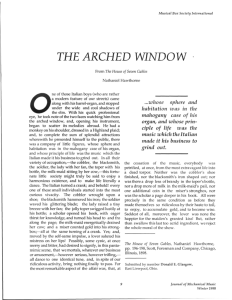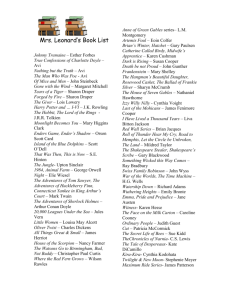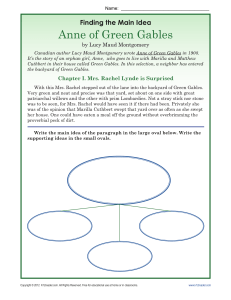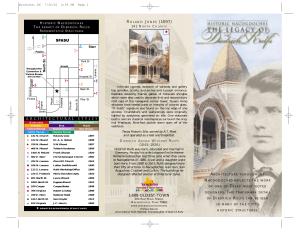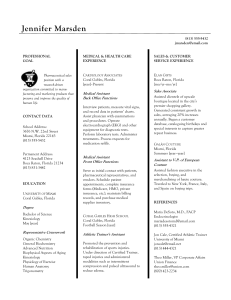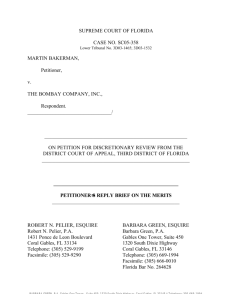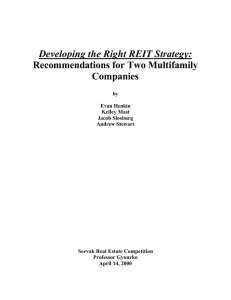the house of the seven gables.
advertisement
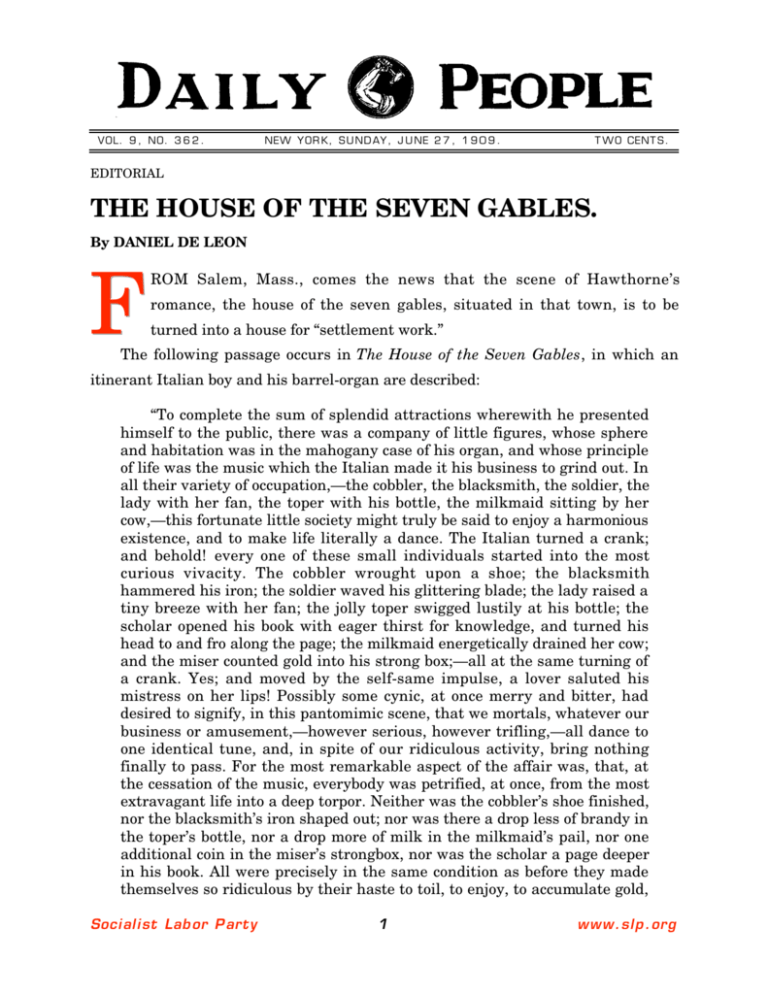
V OL. 9 , NO. 3 6 2 . NEW Y OR K, S U ND AY , J U NE 2 7 , 1 9 0 9 . T W O CENT S . EDITORIAL THE HOUSE OF THE SEVEN GABLES. By DANIEL DE LEON F ROM Salem, Mass., comes the news that the scene of Hawthorne’s romance, the house of the seven gables, situated in that town, is to be turned into a house for “settlement work.” The following passage occurs in The House of the Seven Gables, in which an itinerant Italian boy and his barrel-organ are described: “To complete the sum of splendid attractions wherewith he presented himself to the public, there was a company of little figures, whose sphere and habitation was in the mahogany case of his organ, and whose principle of life was the music which the Italian made it his business to grind out. In all their variety of occupation,—the cobbler, the blacksmith, the soldier, the lady with her fan, the toper with his bottle, the milkmaid sitting by her cow,—this fortunate little society might truly be said to enjoy a harmonious existence, and to make life literally a dance. The Italian turned a crank; and behold! every one of these small individuals started into the most curious vivacity. The cobbler wrought upon a shoe; the blacksmith hammered his iron; the soldier waved his glittering blade; the lady raised a tiny breeze with her fan; the jolly toper swigged lustily at his bottle; the scholar opened his book with eager thirst for knowledge, and turned his head to and fro along the page; the milkmaid energetically drained her cow; and the miser counted gold into his strong box;—all at the same turning of a crank. Yes; and moved by the self-same impulse, a lover saluted his mistress on her lips! Possibly some cynic, at once merry and bitter, had desired to signify, in this pantomimic scene, that we mortals, whatever our business or amusement,—however serious, however trifling,—all dance to one identical tune, and, in spite of our ridiculous activity, bring nothing finally to pass. For the most remarkable aspect of the affair was, that, at the cessation of the music, everybody was petrified, at once, from the most extravagant life into a deep torpor. Neither was the cobbler’s shoe finished, nor the blacksmith’s iron shaped out; nor was there a drop less of brandy in the toper’s bottle, nor a drop more of milk in the milkmaid’s pail, nor one additional coin in the miser’s strongbox, nor was the scholar a page deeper in his book. All were precisely in the same condition as before they made themselves so ridiculous by their haste to toil, to enjoy, to accumulate gold, Soci al i st Lab or P art y 1 w w w . sl p . org The House of the Seven Gables Daily People, June 27, 1909 and to become wise. Saddest of all, moreover, the lover was none the happier for the maiden’s granted kiss! But rather than swallow this last too acrid ingredient we reject the whole moral of the show.” There is nothing in English literature of more elegant finish, in point of diction, than The House of the Seven Gables—nor anything more insidiously cynical, as may be gathered from the, in point of literature, exquisite passage just quoted. The spirit that pervades The House of the Seven Gables comes out more fully in the following passage from the same author’s Blithedale Romance: “In my own behalf I rejoice that I could once think better of the world than it deserved. It is a mistake into which men seldom fall twice in a lifetime, or, if so, the rarer and higher the nature that can thus magnanimously press onward....Whatever else I may repent of, therefore, let it be reckoned neither among my sins nor follies that I once had faith and force enough to form generous hopes of the world’s destiny.” Through the wide corridor and spacious paneled rooms of the Salem house of seven gables in Hawthorne’s story, there stalks not the ghost of the old active and aggressive Colonel Pyncheon. It is the ghost of a Hamlet, moaning as it stalks:— The time is out of joint:—O cursed spite, That ever I was born to set it right! “Settlement work,” so-called, is an aggravated case of Hamletism—the despondency of impotence, broken into by fits of slothful activity, while all around a seething world calls for virile action. It is in the fitness of things that the Salem house of the seven gables should be purchased for “settlement work.” And yet there are people who prate of things happening by accident. Transcribed and edited by Robert Bills for the official Web site of the Socialist Labor Party of America. Uploaded September 2010 slpns@slp.org Soci al i st Lab or P art y 2 w w w . sl p . org

